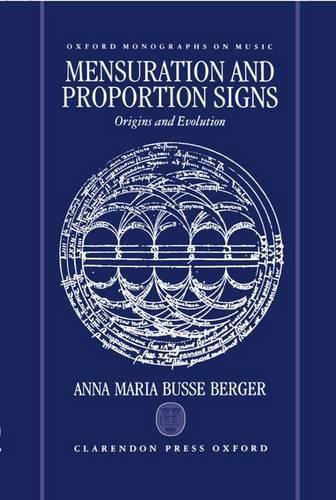Full Product Details
Author: Anna Maria Busse Berger (Associate Professor of Music, Department of Music, Associate Professor of Music, Department of Music, University of California, Davis, USA)
Publisher: Oxford University Press
Imprint: Clarendon Press
Dimensions:
Width: 16.00cm
, Height: 2.30cm
, Length: 24.40cm
Weight: 0.618kg
ISBN: 9780198162308
ISBN 10: 0198162308
Pages: 284
Publication Date: 21 January 1993
Audience:
Professional and scholarly
,
Professional & Vocational
Format: Hardback
Publisher's Status: Active
Availability: To order

Stock availability from the supplier is unknown. We will order it for you and ship this item to you once it is received by us.
Reviews
<br> A major achievement in the history of discourse about music. --Speculum<br> Probably essential reading for scholars and, in particular, performers specializing in music of the 14th to the 16th century. --Choice<br> Busse Berger investigates a difficult subject in which she has already established herself as a virtuoso in both oral and written performance....This book has assembled much useful material on the theoretical and musical use of mensuration and proportion signs. --Early Music<br> A welcome guide to this complex and fascinating subject....An important contribution to the growing literature concerning durational and temporal issues in early music. Its careful organization and rigorous scholarship will satisfy the most demanding reader, yet its concern for clarity and its plentiful diagrams and tables, will attract even the novice to this fascinating topic. It should be required reading for anyone who studies, performs, and enjoys this repertoire. --Fontes Artis Musicae<br>
A major achievement in the history of discourse about music. --Speculum<br> Probably essential reading for scholars and, in particular, performers specializing in music of the 14th to the 16th century. --Choice<br> Busse Berger investigates a difficult subject in which she has already established herself as a virtuoso in both oral and written performance....This book has assembled much useful material on the theoretical and musical use of mensuration and proportion signs. --Early Music<br> A welcome guide to this complex and fascinating subject....An important contribution to the growing literature concerning durational and temporal issues in early music. Its careful organization and rigorous scholarship will satisfy the most demanding reader, yet its concern for clarity and its plentiful diagrams and tables, will attract even the novice to this fascinating topic. It should be required reading for anyone who studies, performs, and enjoys this repertoire. --Fontes Artis Musicae<br> [A] useful and provocative book....The book opens up as many avenues for further research as it sums up from past research, and for this reason it will be a useful reference work. It is written with authority and the presentation is very clear-not an easy accomplishment for a book devoted so rigorously to one of the most daunting topics in European music history....The book is overflowing with fresh insights, recastings of old debates, new ways to extrapolate evidence, realignments of theoretical traditions, improved translations, etc.....The interdisciplinary dimension makes a very fresh contribution to the topic....Fifteenth-century studies will benefit from its exploration, presented here in animportant book on music and culture. --Renaissance Quarterly<br>
A major achievement in the history of discourse about music. --Speculum Probably essential reading for scholars and, in particular, performers specializing in music of the 14th to the 16th century. --Choice Busse Berger investigates a difficult subject in which she has already established herself as a virtuoso in both oral and written performance....This book has assembled much useful material on the theoretical and musical use of mensuration and proportion signs. --Early Music A welcome guide to this complex and fascinating subject....An important contribution to the growing literature concerning durational and temporal issues in early music. Its careful organization and rigorous scholarship will satisfy the most demanding reader, yet its concern for clarity and its plentiful diagrams and tables, will attract even the novice to this fascinating topic. It should be required reading for anyone who studies, performs, and enjoys this repertoire. --Fontes Artis Musicae




